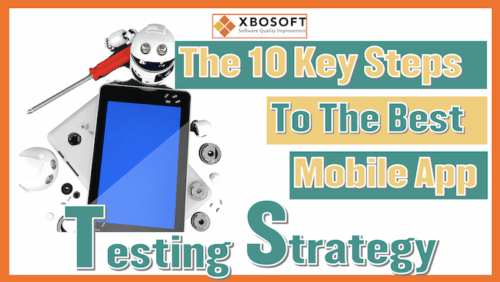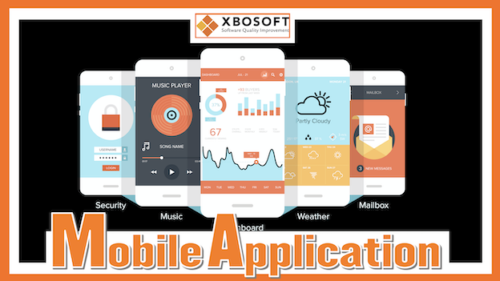Mobile testing in the cloud: An exploration of how cloud-based testing platforms can help you test your mobile software more efficiently and cost-effectively
| All trends indicate that mobile device usage continues to grow in almost all demographics. Thus, the importance of ensuring that mobile software is of high quality becomes increasingly crucial. Mobile testing, which helps to identify and fix defects and ensure that the software performs as intended on a variety of devices and operating systems, has become a critical element in every developer’s ‘to-do’ list. |
Traditionally, mobile testing has been a time-consuming and resource-intensive process, requiring the use of physical devices and in-house infrastructure. However, with the emergence of cloud-based testing platforms, it is now possible to perform mobile testing in the cloud more efficiently and cost-effectively.
In this blog post, we will explore how mobile testing in the cloud works, the benefits they offer, and some of the limitations to be aware of. We will also provide examples of some commercially available cloud-based testing platforms and discuss their unique features and capabilities.
What are cloud-based testing platforms?
Cloud-based testing platforms are online platforms that allow users to test mobile software in a cloud environment, rather than on physical devices. These platforms provide a range of testing services, including functional testing, performance testing, security testing, and usability testing.
One of the main advantages of cloud-based testing platforms is that they offer a large selection of virtual devices and operating systems, which can be accessed remotely from any location with an internet connection. This means that users can test their software on a wide range of devices and operating systems without the need for physical devices or in-house infrastructure. This is a big advantage since new devices from each manufacturer come out annually thus helping to avoid investing in an extensive mobile device lab.
Cloud-based testing platforms also offer a range of testing tools and frameworks, which can be used to automate testing and reduce the time and resources required for testing. This can help to improve the efficiency and cost-effectiveness of mobile testing.
Benefits of mobile testing in the cloud
There are several benefits to using cloud-based testing platforms for mobile testing, including:
❒ Cost-effectiveness: One of the main advantages of cloud-based testing platforms is their cost-effectiveness. Because users do not need to purchase and maintain physical devices or in-house infrastructure, the cost of mobile testing in the cloud can be substantially reduced.
❒ Flexibility: Cloud-based testing platforms offer flexibility in terms of the devices and operating systems that can be tested. Users can choose from a wide range of virtual devices and operating systems, which can be accessed remotely from any location with an internet connection.
❒ Scalability: Cloud-based testing platforms can be easily scaled up or down to meet changing testing needs. This means that users can test their software on a larger number of devices and operating systems if needed.
❒ Speed: Cloud-based testing platforms allow users to test their software on multiple devices and operating systems simultaneously, which can significantly speed up the testing process.
❒ Automation: Many cloud-based testing platforms offer a range of testing tools and frameworks that can be used to automate testing processes. This can help to reduce the time and resources required for testing and improve the efficiency of the testing process.
Limitations of cloud-based testing platforms
While cloud-based testing platforms offer many benefits, some limitations of mobile testing in the cloud include:
❒ Limited access to physical devices: Because cloud-based testing platforms rely on virtual devices, users cannot access physical devices for testing. This can make it difficult to test certain aspects of software performance, such as battery life and network connectivity. This means that you’ll still need a small mobile testing lab for some testing requirements.
❒ Internet connectivity: Cloud-based testing platforms require an internet connection to function, which can be a limitation in certain situations. If the internet connection is unstable or unavailable, it can affect the ability to perform testing. This can also make testing slow depending on what you’re trying to test.
❒ Compatibility issues: While cloud-based testing platforms offer a wide range of virtual devices and operating systems, some compatibility issues arise when testing on certain combinations of devices and operating systems.
❒ Security concerns: Some users may have concerns about the security of their software and data when using a cloud-based testing platform. It is important to research the security measures in place and ensure that the platform meets the necessary security standards.
Popular cloud-based testing platforms
There are a number of commercially available cloud-based testing platforms on the market, each with its own unique benefits and limitations. Some of the most popular platforms include:
❒ AWS Device Farm
This platform, offered by Amazon Web Services, allows developers to test their mobile software on a wide range of physical and virtual devices, including smartphones, tablets, and even Internet of Things (IoT) devices. The platform also includes a variety of testing tools, such as automated testing and performance analysis, as well as support for a variety of programming languages and frameworks.
|
One of the major benefits of AWS Device Farm is its scalability, as developers can easily add or remove devices as needed. |
|
| However, the platform can be expensive for large-scale testing projects, and the cost of using physical devices can add up quickly. |
❒ Appium
This open-source testing platform allows developers to write and run automated tests for mobile apps using a variety of programming languages as well as frameworks. Appium supports testing on both Android and iOS devices and can be used in conjunction with cloud-based testing platforms like AWS Device Farm or Sauce Labs.
| One of the major benefits of Appium is its flexibility, as it can be easily integrated into a variety of development workflows. | |
| However, the platform can be difficult for beginners to learn and set up, and may require some additional configuration and customization. |
❒ Sauce Labs
This cloud-based testing platform offers a variety of tools for testing mobile and web-based software, including support for automated testing and performance analysis. Sauce Labs supports testing on a wide range of devices and operating systems, including Android, iOS, and Windows.
| One of the major benefits of Sauce Labs is its ease of use, as the platform includes a variety of pre-configured environments and testing tools. | |
| However, the platform can be expensive for large-scale testing projects, and may not offer as much flexibility as some of the other options on this list. |
❒ Testdroid
A cloud-based testing platform that allows users to test their mobile apps on a range of devices and operating systems. Testdroid is a commercial platform and requires an internet connection to function, but has security measures in place and may have compatibility issues with certain device and operating system combinations.
| It offers support for functional, performance, and security testing, as well as tools for debugging and crash reporting. | |
| It does not offer access to physical devices for testing. |
❒ Other Platforms
In addition to these platforms, there are a number of other cloud-based testing options available, including Firebase Test Lab, Microsoft Azure DevOps, and Xamarin Test Cloud. Each of these platforms has its own unique benefits and limitations, and it’s important for developers to carefully evaluate their options prior to executing a comprehensive test plan.
Conclusion
Cloud-based testing platforms offer a cost-effective and efficient way to test mobile software. They provide a wide range of virtual devices and operating systems, as well as tools and frameworks for automating testing processes. However, it is essential to be aware of the limitations of these platforms, including limited access to physical devices, potential compatibility issues, cost, and security concerns. By carefully considering the features and capabilities of different cloud-based testing platforms, businesses can choose the best solution for their mobile testing needs. In the end, we usually recommend a combination of cloud-based testing with a local mobile testing lab as some functions are best tested on real devices for a variety of reasons.
Need Help with Your Mobile Testing?
Most Popular
 |
How to Build a Mobile Application Testing Strategy By: Amy Dong |
|
 |
Key Challenges of Mobile Application Quality Assurance By: Philip Lew |
|
 |
Using Appium for Mobile Test Automation By: Philip Lew |
|
Contact us today for your Mobile Testing.
We Recommend
How to Build a Mobile Application Testing Strategy
By Amy Dong|August 22nd, 2022
Mobile application testing is the process of testing a mobile app for usability, functionality, and consistency. Usually completed before the app release, testing allows app makers to determine if the software meets expected business and technical requirements and offers a good user experience.
Key Challenges of Mobile Application Quality Assurance
By Philip Lew|November 12th, 2021
In a study from ABI Research (June 2011), users of enterprise B2E (business-to-employee) and B2C (business-to-customer) smartphone and media tablet mobile applications are forecast to grow at a rate of nearly 90% and exceed 830 million active users by 2016.
Using Appium for Mobile Test Automation
By Jimmy Florent | September 5, 2021
Discover the challenges of Agile sizing, Epics, Stories, Tasks, and Spikes. We will start the discussion by defining the Agile components and then discuss the different sizing processes used and the thought process behind the philosophies.





Leave A Comment